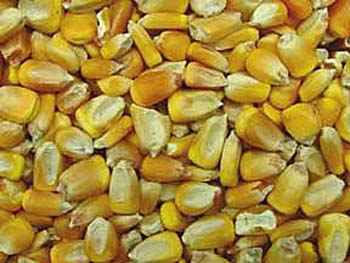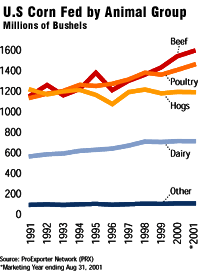|
Corn When we look back at that first Thanksgiving, so many years ago, it's tempting to feel bad for the Native Americans, who foolishly welcomed the Pilgrims and were subsequently violently massacred and given smallpox by the White Invaders from Europe.
When we look back at that first Thanksgiving, so many years ago, it's tempting to feel bad for the Native Americans, who foolishly welcomed the Pilgrims and were subsequently violently massacred and given smallpox by the White Invaders from Europe.
There's some merit to this point of view, but there is at least some small ironic satisfaction in knowing that the natives introduced the Europeans to the substance which may yet be their downfall—corn. Corn is not inherently bad. There's a lot to be said for it. It's a hardy plant that grows with relative ease in a wide variety of climates. It can be served in a wide variety of ways. It can be mass produced affordably and it can be used to make a number of useful derivative products. The question is: Did God in his infinite wisdom mean for every living thing on the planet to eat corn as part of every meal, every day, in mass quantities, from children to senior citizens to cows? You see, it's not just gnawing on an ear of corn from the garden. Corn starch is used in virtually every bread or pastry you can buy in a major chain grocery store. And with a few scattered exception, every bread you can buy anywhere else too. Corn starch, syrup and cellulose are used in every medicine you can put in your mouth. Then there's the sugar. Any time you see the simple word sugar on an ingredient list you can substitute "corn syrup." That means in soda, in cookies, in candy bars, even in BAGS OF SUGAR. And not just sugar. Almost every sugar-free sweetener on the market today is made from a corn product.
Anything on the label you can't pronounce is better than even odds to be corn. Considering all this, you would think the corn industry would be a fiercely independent group of farmers who are sitting pretty on the fruits of their labor. Not so! The U.S. corn industry (easily the world leader) gets $5.5 BILLION in federal subsidies, an ample amount of which is kicked back to politicians in the form of campaign contributions, thus perpetuating a system in which the national interest is heavily invested in creating more and more and MORE avenues through which to feed corn to an unsuspecting public. But, amazingly enough, it gets worse. Not satisfied with being the largest single component of the average American's diet, the corn industry genetically modifies its product, sometimes without government supervision, and then distributes the end results to consumers without labeling it. And genetically modified "supercorn" is now sweeping through North America much like Hitler wanted the Aryan strain to sweep over Europe. GM corn has already profoundly damaged Mexico's native "wild" strains of corn. Pretty soon, there won't be any unaltered corn left, even for comparison purposes. All this would be bad enough on the face of it. The human metabolism and digestive system craves variety. Too much of the same thing is bad, especially when that thing corn is so undigestible that the unprocessed kernels will pass untouched through your entire digestive system to emerge whole and unscathed in your feces.
So the livestock gets sick. That sickness is treated by antibiotics and hormones which then bleed into virtually every piece of meat or cup of milk served in America, making the people who consume them sick. Now, if it's really bad for cows—who have THREE stomachs—to eat nothing but corn, what is it doing to those of us with only ONE stomach? The corn lobby, one of the most powerful in American politics, does not want to see that question answered. Not surprisingly, there has been little research done on the topic at our fine government supported universities and research labs. Scratch "little." There are NO studies covering the broad societal issue. What little information HAS trickled out is pretty alarming. The most obvious health effect of the corn glut is obesity. Granted, with a few exceptions, most people who are overweight have only themselves to blame. But we live in a world where the food industry spends millions of dollars marketing sugar (aka corn syrup) to PRE-SCHOOLERS. Food manufacturers hire people with doctorates in child psychology to help them outsmart four-year-olds (and their parents). You can even buy corn puffs coated with corn syrup, made expressly for kindergarten kids.
Drug guru Terence McKenna long argued that refined sugar easily fits the technical definition of an addictive drug after all, it's harmful to your health and you suffer withdrawal symptoms if you try to quit using it. Nevertheless, heroin is considered "bad" but extraneous sugar (aka corn) is included in food and medicine products aimed at ONE-YEAR-OLDS. Other possible effects of excessive corn consumption include diabetes (related to the aforementioned hypoglycemia), heart disease and tooth decay.
So what does the future hold? More corn, in all likelihood. The U.S. government is putting out something on the order of $20 billion in farm subsidies a year, the most concentrated portion of which goes for corn. Bush administration Health and Human Services director Tommy Thompson, the overweight man purportedly in charge of keeping the nation healthy, told ABC News in 2003 that the gigantic corn subsidies don't affect nutrition for Americans. You see, he explained, "the subsidy programs are things that are done through Congress." He didn't complete the thought, but we'll do it for him: "Naturally, anything done by Congress can't possibly have an effect on real people." Amber waves of grain, my ass. |
 But just because it doesn't taste sugary doesn't mean you're clear. Corn syrup, starch and/or oil is added to french fries, peanut butter, saltines, steak sauce, table salt, margarine, iced tea, fruit juice (even ones that claim to be 100% juice), "raw" honey, fish sticks, soy milk, wine, beer, liquor, chicken nuggets, flour, barley, caramel, Vitamin C, vanilla extract, vinegar and/or yeast. Corn-derived glycerin is found in almost every soap, lotion, toothpaste and shampoo.
But just because it doesn't taste sugary doesn't mean you're clear. Corn syrup, starch and/or oil is added to french fries, peanut butter, saltines, steak sauce, table salt, margarine, iced tea, fruit juice (even ones that claim to be 100% juice), "raw" honey, fish sticks, soy milk, wine, beer, liquor, chicken nuggets, flour, barley, caramel, Vitamin C, vanilla extract, vinegar and/or yeast. Corn-derived glycerin is found in almost every soap, lotion, toothpaste and shampoo.
 In this paradigm, people are only a little better off than cattle. Almost every chicken, pig and cow in the United States is force-fed corn. Even salmon! Alas, these animals can't properly digest a diet of all corn (not to mention the massive amounts of pesticides used to keep the corn bug free).
In this paradigm, people are only a little better off than cattle. Almost every chicken, pig and cow in the United States is force-fed corn. Even salmon! Alas, these animals can't properly digest a diet of all corn (not to mention the massive amounts of pesticides used to keep the corn bug free).
 The processed sugar game leads to its own complications, including hyperglycemia and hypoglycemia. The symptoms for each of these disorders, interestingly enough, can be alleviated by eating more sugar, much like the symptoms for heroin withdrawal can be treated by taking heroin.
The processed sugar game leads to its own complications, including hyperglycemia and hypoglycemia. The symptoms for each of these disorders, interestingly enough, can be alleviated by eating more sugar, much like the symptoms for heroin withdrawal can be treated by taking heroin.
 An unknown number of people additionally suffer from corn allergies. The reason the number is unknown is that it's difficult to remove all the corn from your diet to test the premise (especially if you eliminate corn-fed meat and corn-treated meat products). And if you somehow succeed in doing so, you will find that you have incidentally have removed virtually everything else from your diet as well.
An unknown number of people additionally suffer from corn allergies. The reason the number is unknown is that it's difficult to remove all the corn from your diet to test the premise (especially if you eliminate corn-fed meat and corn-treated meat products). And if you somehow succeed in doing so, you will find that you have incidentally have removed virtually everything else from your diet as well.